
1925 ALUMINUM V-8 ENGINE
IS A 1926 CADILLAC 314 CU. IN. V-8 ENGINE!
(Click photos to enlarge)
I have had this engine block in the barn for over 25 years. I purchased it from a man in Philadelphia who said he had found it abandoned
in a shed somewhere in Pennsylvania. I would appreciate any photos or documentation that would help me identify it and learn who built it.
This block has a cast date of 10-22-25 and casting number of 57500B.
This engine was very nicely made and had pressure oiling with an oil pump showing in photos #1 and #2 driven by the horizontal shaft off the
camshaft with front and rear oil distributors to the upper engine. The starter motor was unique in that it was mounted vertically where the
green bottle is.
This engine is very similar to one used in the 1925 Cunningham but the only Cunningham engine photos I have seen are just different enough to
rule out that identification. Hispano-Suiza pioneered aluminum V-8 aircraft engines during this time period but there seems to be no
indication this engine was made for a propeller attachment. The long snout on the timing cover has a brass doughnut for mounting in a frame
and contains a shaft for a hand crank that fit right into the front of the crankshaft.
I welcome all suggestions for identifying this engine and the vehicle it powered.
UPDATE AUGUST 2005
The overall length of the aluminum block from front timing cover surface to rear of bell housing is 34 inches. Add another 12" when you
install the timing cover and front crank extension. The largest width is at the cast aluminum mounting extensions off the rear of the engine
and that is about 24". The oil pan measures 26" X 9 1/2" wide. Be sure and click on the photos and blow them up full size. Note, the
vertical starter mounted on top where the bottle is and the strange teeth configuration on the flywheel.
I can only guess at the diameter of the cylinder bores as I don't have the cylinders themselves only the engine block. The dirt outline
on the block indicates the cylinders were probably cast in pairs and then bolted on. The cylinder mounting studs only protrude from the
block about 1 inch so the cylinders must have had a mounting flange all the way around at the bottom where they bolted to the block.
The opening in the block measures about 3 1/2" and, if we assume the piston skirt dropped down into the block area at the bottom of its
stroke, then the bore was definitely less than that. Maybe 3" or less depending on the thickness of the cast iron cylinders. As best I
can measure the crankshaft journals the stroke was pretty close to 5 inches or just a little bit less. 3" bore x 5" stroke x 8 cylinders
equals 283 cubic inches which is a fairly small motor but with a relatively long stroke. Lots of suppositions.
UPDATE #2- COULD BE A 1926 CADILLAC!
1926 Cadillac Engine numbers: 100001 to 150619 [1925-1926]
My engine serial number, 1124XX with a very large "star" stamped after the number, is about 3 months into the production year which fits
nicely with the casting date of 10-22-25 making this an early 1926 model that probably was produced in late 1925! The engine number is
stamped at the very top of the front of the block at the base of the oil fill extension and is faintly visible in one of the photos above.
The 1925-26 series 314 cu. in. engine was 3 1/8 x 5 1/8 inches, which fits perfectly with my configuration!!
I wish I knew why other attributes of my block don't match any of the drawings at Car-Nection .com. Perhaps the "star" after the serial
number means a later replacement block?
If you view the 1927 engine with the vertical starter that is posted on "The Cadillac Database" at www.car-nection.com it looks
surprisingly like my engine. Mine would be a 1926 and not a 1927 but I definitely have the vertical starter like the one labeled 1927.
One of the articles indicated that the vertical starter did start in '26 so that could fit. The 1927 engine photo shows a vertical boss
on the side of the block that seems to house an oil passage. My block has a very similar boss but it is located in front of the water pipe.
I definitely do not have provisions for the generator on the right front as shown in the photo. There is no attaching point there and in
its place is a large oil pump driven off the camshaft. Otherwise the oil pan looks identical and the engine is sure related as there are
too many similarities.
MYSTERY SOLVED!! With the help of several knowledgeable collectors. Thanks to the wonderful write up on the PreWar Cars website this engine has been identified as belonging to a 1926 Cadillac 314 cu.in.!
The article posted by Joris has generating lots of interest and good comments and suggestions from several helpful collectors all over the
world. Hans C. from New Zeland has both a 1926 and 1927 Cadillac that he is in the process of restoring and was kind enough to send the
pictures that you see below. Thanks you, Hans, and a sincere "thank you" to all who took the time to respond to my query.
 Engine serial number is 1124xx with a large “star” after the number. I don’t have the cylinders or upper parts to this engine but it looks
like the cylinders were cast in pairs and bolted on. There is a coolant passage through the center of the block that fed the cylinders but
there is no indication this engine had a water pump. The water casting is iron and casting number is 57547.
Engine serial number is 1124xx with a large “star” after the number. I don’t have the cylinders or upper parts to this engine but it looks
like the cylinders were cast in pairs and bolted on. There is a coolant passage through the center of the block that fed the cylinders but
there is no indication this engine had a water pump. The water casting is iron and casting number is 57547.
 This is evident by looking at the vertical teeth on the pressure
plate. Note evidence of what must have been a plate type clutch assembly?
This is evident by looking at the vertical teeth on the pressure
plate. Note evidence of what must have been a plate type clutch assembly? 
The front
of the crankshaft does not extend through the timing cover and there was no belt pulley attached. The only place for a pulley was on the front
of the camshaft and that pulley must have run an accessory that was mounted between the two aluminum ears on the top, front of the engine. This
was probably a generator. The front of the crankshaft is formed into a large splined gear that fits a heavy timing chain to run around the
camshaft and an idler gear.
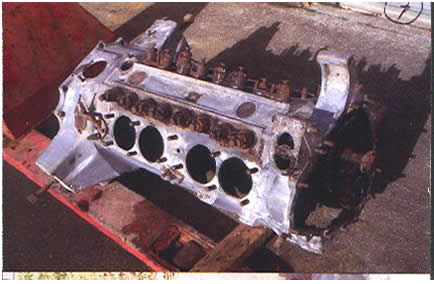
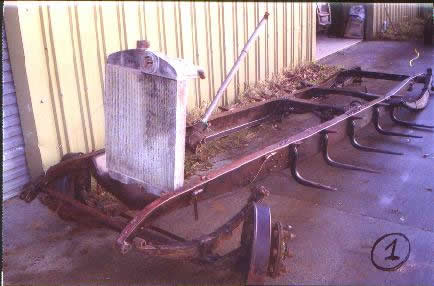
This is a 1926 Cadillac
chassis ready for restoration.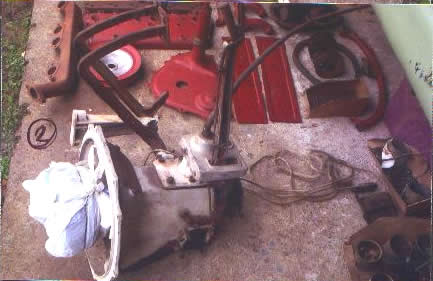
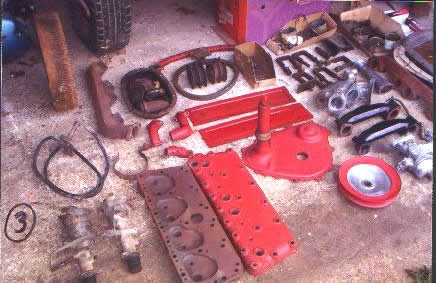
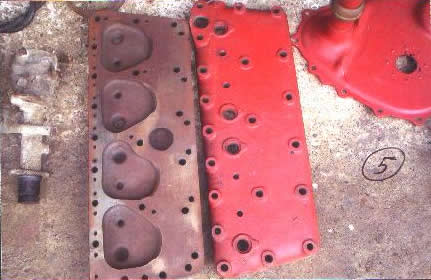
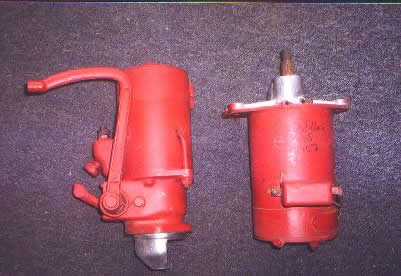
THIS IS THE FINE PRINT
You are visitor #